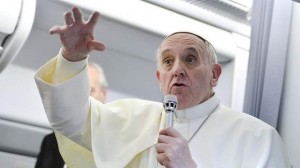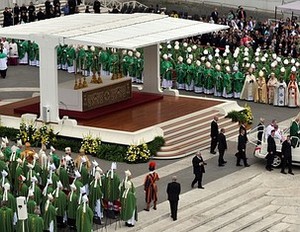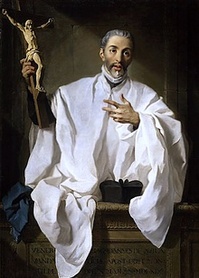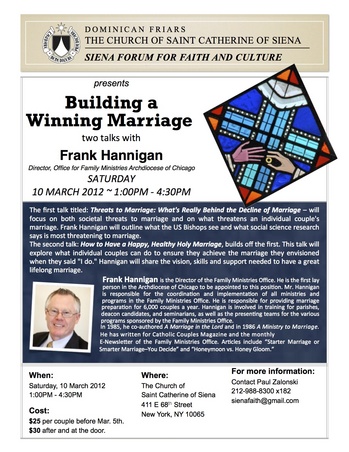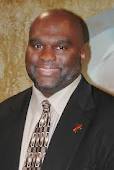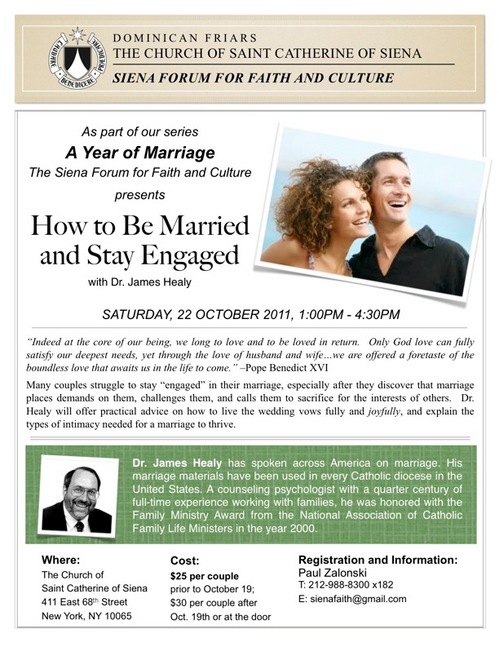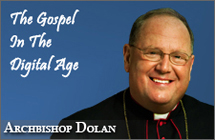On the indissolubility of marriage and the debate concerning the civilly remarried and the sacraments
After the announcement of the extraordinary synod that will take place in October of 2014 on the pastoral care of families, some questions have been raised regarding the question of divorced and remarried members of the faithful and their relationship to the sacraments. In order to deepen understanding on this pressing subject so that clergy may accompany their flock more perfectly and instruct them in a manner consistent with the truth of Catholic Doctrine, we are publishing an extensive contribution from the Archbishop Prefect of the Congregation for the Doctrine of the Faith.
The problem concerning members of the faithful who have entered into a new civil union after a divorce is not new. The Church has always taken this question very seriously and with a view to helping the people who find themselves in this situation. Marriage is a sacrament that affects people particularly deeply in their personal, social and historical circumstances. Given the increasing number of persons affected in countries of ancient Christian tradition, this pastoral problem has taken on significant dimensions. Today even firm believers are seriously wondering: can the Church not admit the divorced and remarried to the sacraments under certain conditions? Are her hands permanently tied on this matter? Have theologians really explored all the implications and consequences?
These questions must be explored in a manner that is consistent with Catholic doctrine on marriage. A responsible pastoral approach presupposes a theology that offers “the full submission of intellect and will to God who reveals, freely  assenting to the truth revealed by him” (Dei Verbum 5). In order to make the Church’s authentic doctrine intelligible, we must begin with the word of God that is found in sacred Scripture, expounded in the Church’s Tradition and interpreted by the Magisterium in a binding way.
assenting to the truth revealed by him” (Dei Verbum 5). In order to make the Church’s authentic doctrine intelligible, we must begin with the word of God that is found in sacred Scripture, expounded in the Church’s Tradition and interpreted by the Magisterium in a binding way.
The Testimony of Sacred Scripture
Looking directly to the Old Testament for answers to our question is not without its difficulties, because at that time marriage was not yet regarded as a sacrament. Yet the word of God in the Old Covenant is significant for us to the extent that Jesus belongs within this tradition and argues on the basis of it. In the Decalogue, we find the commandment “thou shalt not commit adultery” (Ex 20:14), but elsewhere divorce is presented as a possibility. According to Dt 24:1-4, Moses lays down that a man may present his wife with a certificate of dismissal and send her away from his house, if she no longer finds favour with him. Thereafter, both husband and wife may embark upon a new marriage. In addition to this acceptance of divorce, the Old Testament also expresses certain reservations in its regard. The comparison drawn by the prophets between God’s covenant with Israel and the marriage bond includes not only the ideal of monogamy, but also that of indissolubility. The prophet Malachi expresses this clearly: “Do not be faithless to the wife of your youth … with whom you have made a covenant” (Mal 2:14-15).
Above all, it was his controversies with the Pharisees that gave Jesus occasion to address this theme. He distanced himself explicitly from the Old Testament practice of divorce, which Moses had permitted because men were “so hard of heart”, and he pointed to God’s original will: “from the beginning of creation, God made them male and female. For this reason a man shall leave his father and mother and … the two shall become one flesh. What therefore God has joined together let not man put asunder” (Mk 10:5-9; cf. Mt 19:4-9; Lk 16:18). The Catholic Church has always based its doctrine and practice upon these sayings of Jesus concerning the indissolubility of marriage. The inner bond that joins the spouses to one another was forged by God himself. It designates a reality that comes from God and is therefore no longer at man’s disposal.
Today some exegetes take the view that even in the Apostolic era these dominical sayings were applied with a degree of flexibility: notably in the case of porneia/unchastity (cf. Mt 5:32; 19:9) and in the case of a separation between a Christian and a non-Christian partner (cf. 1 Cor 7:12-15). The unchastity clauses have been the object of fierce debate among exegetes from the beginning. Many take the view that they refer not to exceptions to the indissolubility of marriage, but to invalid marital unions. Clearly, however, the Church cannot build its doctrine and practice on controversial exegetical hypotheses. She must adhere to the clear teaching of Christ.
Saint Paul presents the prohibition on divorce as the express will of Christ: “To the married I give charge, not I but the Lord, that the wife should not separate from her husband (but if she does, let her remain single or else be reconciled to her husband) and that the husband should not divorce his wife” (1 Cor 7:10-11). At the same time he permits, on his own authority, that a non-Christian may separate from a partner who has become Christian. In this case, the Christian is “not bound” to remain unmarried (1 Cor 7:12-16). On the basis of this passage, the Church has come to recognize that only a marriage between a baptized man and a baptized woman is a sacrament in the true sense, and only in this instance does unconditional indissolubility apply. The marriage of the unbaptized is indeed ordered to indissolubility, but can under certain circumstances – for the sake of a higher good – be dissolved (privilegium Paulinum). Here, then, we are not dealing with an exception to our Lord’s teaching. The indissolubility of sacramental marriage, that is to say, marriage that takes place within the mystery of Christ, remains assured.
Of greater significance for the biblical basis of the sacramental view of marriage is the Letter to the Ephesians, where we read: “Husbands, love your wives, as Christ loved the Church and gave himself up for her” (Eph 5:25). And shortly afterwards, the Apostle adds: “For this reason, a man shall leave his father and mother and be joined to his wife and the two shall become one flesh. This mystery is a profound one, and I am saying that it refers to Christ and the Church” (Eph 5:31-32). Christian marriage is an effective sign of the covenant between Christ and the Church. Because it designates and communicates the grace of this covenant, marriage between the baptized is a sacrament.
The Testimony of the Church’s Tradition
The Church Fathers and Councils provide important testimony regarding the way the Church’s position evolved. For the Fathers, the biblical precepts on the subject are binding. They reject the State’s divorce laws as incompatible with the teaching of Jesus. The Church of the Fathers rejected divorce and remarriage, and did so out of obedience to the Gospel. On this question, the Fathers’ testimony is unanimous.
 In patristic times, divorced members of the faithful who had civilly remarried could not even be readmitted to the sacraments after a period of penance. Some patristic texts, however, seem to imply that abuses were not always rigorously corrected and that from time to time pastoral solutions were sought for very rare borderline cases.
In patristic times, divorced members of the faithful who had civilly remarried could not even be readmitted to the sacraments after a period of penance. Some patristic texts, however, seem to imply that abuses were not always rigorously corrected and that from time to time pastoral solutions were sought for very rare borderline cases.
In many regions, greater compromises emerged later, particularly as a result of the increasing interdependence of Church and State. In the East this development continued to evolve, and especially after the separation from the See of Peter, it moved towards an increasingly liberal praxis. In the Orthodox Churches today, there are a great many grounds for divorce, which are mostly justified in terms of oikonomia, or pastoral leniency in difficult individual cases, and they open the path to a second or third marriage marked by a penitential character. This practice cannot be reconciled with God’s will, as expressed unambiguously in Jesus’ sayings about the indissolubility of marriage. But it represents an ecumenical problem that is not to be underestimated.
In the West, the Gregorian reform countered these liberalizing tendencies and gave fresh impetus to the original understanding of Scripture and the Fathers. The Catholic Church defended the absolute indissolubility of marriage even at the cost of great sacrifice and suffering. The schism of a “Church of England” detached from the Successor of Peter came about not because of doctrinal differences, but because the Pope, out of obedience to the sayings of Jesus, could not accommodate the demands of King Henry VIII for the dissolution of his marriage.
The Council of Trent confirmed the doctrine of the indissolubility of sacramental marriage and explained that this corresponded to the teaching of the Gospel (cf. DH 1807). Sometimes it is maintained that the Church de facto tolerated the Eastern practice. But this is not correct. The canonists constantly referred to it as an abuse. And there is evidence that groups of Orthodox Christians on becoming Catholic had to subscribe to an express acknowledgment of the impossibility of second or third marriages.
The Second Vatican Council, in the Pastoral Constitution Gaudium et Spes on “The Church in the Modern World”, presents a theologically and spiritually profound doctrine of marriage. It upholds the indissolubility of marriage clearly and distinctly. Marriage is understood as an all-embracing communion of life and love, body and spirit, between a man and a woman who mutually give themselves and receive one another as persons. Through the personally free act of their reciprocal consent, an enduring, divinely ordered institution is brought into being, which is directed to the good of the spouses and of their offspring and is no longer dependent on human caprice: “As a mutual gift of two persons, this intimate union and the good of the children impose total fidelity on the spouses and argue for an unbreakable oneness between them” (no. 48). Through the sacrament God bestows a special grace upon the spouses: “For as God of old made himself present to his people through a covenant of love and fidelity, so now the Saviour of men and the Spouse of the Church comes into the lives of married Christians through the sacrament of matrimony. He abides with them thereafter so that just as he loved the Church and handed himself over on her behalf, the spouses may love each other with perpetual fidelity through mutual self-bestowal.” Through the sacrament the indissolubility of marriage acquires a new and deeper sense: it becomes the image of God’s enduring love for his people and of Christ’s irrevocable fidelity to his Church.
Marriage can be understood and lived as a sacrament only in the context of the mystery of Christ. If marriage is secularized or regarded as a purely natural reality, its sacramental character is obscured. Sacramental marriage belongs to the order of grace, it is taken up into the definitive communion of love between Christ and his Church. Christians are called to live their marriage within the eschatological horizon of the coming of God’s kingdom in Jesus Christ, the incarnate Word of God.
The Testimony of the Magisterium in the Present Day
The Apostolic Exhortation Familiaris Consortio – issued by John Paul II on 22 November 1981 in the wake of the Synod of Bishops on the Christian family in the modern world, and of fundamental importance ever since – emphatically confirms the Church’s dogmatic teaching on marriage. But it shows pastoral concern for the civilly remarried faithful who are still  bound by an ecclesially valid marriage. The Pope shows a high degree of concern and understanding. Paragraph 84 on “divorced persons who have remarried” contains the following key statements: 1. Pastors are obliged, by love for the truth, “to exercise careful discernment of situations”. Not everything and everyone are to be assessed in an identical way. 2. Pastors and parish communities are bound to stand by the faithful who find themselves in this situation, with “attentive love”. They too belong to the Church, they are entitled to pastoral care and they should take part in the Church’s life. 3. And yet they cannot be admitted to the Eucharist. Two reasons are given for this: a) “their state and condition of life objectively contradict that union of love between Christ and the Church which is signified and effected by the Eucharist” b) “if these people were admitted to the Eucharist, the faithful would be led into error and confusion regarding the Church’s teaching about the indissolubility of marriage”. Reconciliation through sacramental confession, which opens the way to reception of the Eucharist, can only be granted in the case of repentance over what has happened and a “readiness to undertake a way of life that is no longer in contradiction to the indissolubility of marriage.” Concretely this means that if for serious reasons, such as the children’s upbringing, the new union cannot be dissolved, then the two partners must “bind themselves to live in complete continence”. 4. Clergy are expressly forbidden, for intrinsically sacramental and theological reasons and not through legalistic pressures, to “perform ceremonies of any kind” for divorced people who remarry civilly, as long as the first sacramentally valid marriage still exists.
bound by an ecclesially valid marriage. The Pope shows a high degree of concern and understanding. Paragraph 84 on “divorced persons who have remarried” contains the following key statements: 1. Pastors are obliged, by love for the truth, “to exercise careful discernment of situations”. Not everything and everyone are to be assessed in an identical way. 2. Pastors and parish communities are bound to stand by the faithful who find themselves in this situation, with “attentive love”. They too belong to the Church, they are entitled to pastoral care and they should take part in the Church’s life. 3. And yet they cannot be admitted to the Eucharist. Two reasons are given for this: a) “their state and condition of life objectively contradict that union of love between Christ and the Church which is signified and effected by the Eucharist” b) “if these people were admitted to the Eucharist, the faithful would be led into error and confusion regarding the Church’s teaching about the indissolubility of marriage”. Reconciliation through sacramental confession, which opens the way to reception of the Eucharist, can only be granted in the case of repentance over what has happened and a “readiness to undertake a way of life that is no longer in contradiction to the indissolubility of marriage.” Concretely this means that if for serious reasons, such as the children’s upbringing, the new union cannot be dissolved, then the two partners must “bind themselves to live in complete continence”. 4. Clergy are expressly forbidden, for intrinsically sacramental and theological reasons and not through legalistic pressures, to “perform ceremonies of any kind” for divorced people who remarry civilly, as long as the first sacramentally valid marriage still exists.
The Congregation for the Doctrine of the Faith’s statement of 14 September 1994 on reception of holy communion by divorced and remarried members of the faithful emphasizes that the Church’s practice in this question “cannot be modified because of different situations” (no. 5). It also makes clear that the faithful concerned may not present themselves for holy communion on the basis of their own conscience: “Should they judge it possible to do so, pastors and confessors … have the serious duty to admonish them that such a judgment of conscience openly contradicts the Church’s teaching” (no. 6). If doubts remain over the validity of a failed marriage, these must be examined by the competent marriage tribunals (cf. no. 9). It remains of the utmost importance, “with solicitous charity to do everything that can be done to strengthen in the love of Christ and the Church those faithful in irregular marriage situations. Only thus will it be possible for them fully to receive the message of Christian marriage and endure in faith the distress of their situation. In pastoral action one must do everything possible to ensure that this is understood not to be a matter of discrimination but only of absolute fidelity to the will of Christ who has restored and entrusted to us anew the indissolubility of marriage as a gift of the Creator” (no. 10).
In the Post-Synodal Apostolic Exhortation Sacramentum Caritatis of 22 February 2007, Benedict XVI summarizes the work of the Synod of Bishops on the theme of the Eucharist and he develops it further. In No. 29 he addresses the situation of divorced and remarried faithful. For Benedict XVI too, this is a “complex and troubling pastoral problem”. He confirms “the Church’s practice, based on Sacred Scripture (cf. Mk 10:2- 12), of not admitting the divorced and remarried to the sacraments”, but he urges pastors at the same time, to devote “special concern” to those affected: in the wish that they “live as fully as possible the Christian life through regular participation at Mass, albeit without receiving communion, listening to the word of God, eucharistic adoration, prayer, participation in the life of the community, honest dialogue with a priest or spiritual director, dedication to the life of charity, works of penance, and commitment to the education of their children”. If there are doubts concerning the validity of the failed marriage, these are to be carefully examined by the competent marriage tribunals. Today’s mentality is largely opposed to the Christian understanding of marriage, with regard to its indissolubility and its openness to children. Because many Christians are influenced by this, marriages nowadays are probably invalid more often than they were previously, because there is a lack of desire for marriage in accordance with Catholic teaching, and there is too little socialization within an environment of faith. Therefore assessment of the validity of marriage is important and can help to solve problems. Where nullity of marriage cannot be demonstrated, the requirement for absolution and reception of communion, according to the Church’s established and approved practice, is that the couple live “as friends, as brother and sister”. Blessings of irregular unions are to be avoided, “lest confusion arise among the faithful concerning the value of marriage”. A blessing (bene-dictio: divine sanctioning) of a relationship that contradicts the will of God is a contradiction in terms.
During his homily at the Seventh World Meeting of Families in Milan on 3 June 2012, Benedict XVI once again had occasion to speak of this painful problem: “I should also like to address a word to the faithful who, even though they agree with the Church’s teachings on the family, have had painful experiences of breakdown and separation. I want you to know that the Pope and the Church support you in your struggle. I encourage you to remain united to your communities, and I earnestly hope that your dioceses are developing suitable initiatives to welcome and accompany you.”
The most recent Synod of Bishops on the theme “New evangelization for the transmission of the Christian faith” (7-28 October 2012) addressed once again the situation of the faithful who after the failure of a marital relationship (not the failure of a marriage, which being a sacrament still remains) have entered a new union and live together without a sacramental marriage bond. In the concluding Message, the Synod Fathers addressed those concerned as follows: “To all of them we want to say that God’s love does not abandon anyone, that the Church loves them, too, that the Church is a house that welcomes all, that they remain members of the Church even if they cannot receive sacramental absolution and the Eucharist. May our Catholic communities welcome all who live in such situations and support those who are in the path of conversion and reconciliation.”
Observations based on Anthropology and Sacramental Theology
The doctrine of the indissolubility of marriage is often met with incomprehension in a secularized environment. Where the fundamental insights of Christian faith have been lost, church affiliation of a purely conventional kind can no longer sustain major life decisions or provide a firm foothold in the midst of marital crises – as well as crises in priestly and religious life. Many people ask: how can I bind myself to one woman or one man for an entire lifetime? Who can tell me what my marriage will be like in ten, twenty, thirty, forty years? Is a definitive bond to one person possible at all? The many marital relationships that founder today reinforce the scepticism of young people regarding definitive life choices.
On the other hand, the ideal – built into the order of creation – of faithfulness between one man and one woman has lost none of its fascination, as is apparent from recent opinion surveys among young people. Most of them long for a stable, lasting relationship, in keeping with the spiritual and moral nature of the human person. Moreover, one must not forget the anthropological value of indissoluble marriage: it withdraws the partners from caprice and from the tyranny of feelings and moods. It helps them to survive personal difficulties and to overcome painful experiences. Above all it protects the children, who have most to suffer from marital breakdown.
Love is more than a feeling or an instinct. Of its nature it is self-giving. In marital love, two people say consciously and intentionally to one another: only you – and you for ever. The word of the Lord: “What God has joined together” corresponds to the promise of the spouses: “I take you as my husband … I take you as my wife … I will love, esteem and honour you, as long as I live, till death us do part.” The priest blesses the covenant that the spouses have sealed with one another before God. If anyone should doubt whether the marriage bond is ontological, let him learn from the word of God: “He who made them from the beginning made them male and female, and said: for this reason a man shall leave his father and mother and be joined to his wife, and the two shall become one flesh. So they are no longer two but one flesh” (Mt 19:4-6).
For Christians, the marriage of baptized persons incorporated into the Body of Christ has sacramental character and therefore represents a supernatural reality. A serious pastoral problem arises from the fact that many people today judge Christian marriage exclusively by worldly and pragmatic criteria. Those who think according to the “spirit of the world” (1 Cor 2:12) cannot understand the sacramentality of marriage. The Church cannot respond to the growing incomprehension of the sanctity of marriage by pragmatically accommodating the supposedly inevitable, but only by trusting in “the Spirit which is from God, that we might understand the gifts bestowed on us by God” (1 Cor 2:12). Sacramental marriage is a testimony to the power of grace, which changes man and prepares the whole Church for the holy city, the new Jerusalem, the Church, which is prepared “as a bride adorned for her husband” (Rev 21:2). The Gospel of the sanctity of marriage is to be proclaimed with prophetic candour. By adapting to the spirit of the age, a weary prophet seeks his own salvation but not the salvation of the world in Jesus Christ. Faithfulness to marital consent is a prophetic sign of the salvation that God bestows upon the world. “He who is able to receive this, let him receive it” (Mt 19:12). Through sacramental grace, married love is purified, strengthened and ennobled. “Sealed by mutual faithfulness and hallowed above all by Christ’s sacrament, this love remains steadfastly true in body and in mind, in bright days or dark. It will never be profaned by adultery or divorce” (Gaudium et Spes, 49). In the strength of the sacrament of marriage, the spouses participate in God’s definitive, irrevocable love. They can therefore be witnesses of God’s faithful love, but they must nourish their love constantly through living by faith and love.
Admittedly there are situations – as every pastor knows – in which marital cohabitation becomes for all intents and purposes impossible for compelling reasons, such as physical or psychological violence. In such hard cases, the Church has always permitted the spouses to separate and no longer live together. It must be remembered, though, that the marriage bond of a valid union remains intact in the sight of God, and the individual parties are not free to contract a new marriage, as long as the spouse is alive. Pastors and Christian communities must therefore take pains to promote paths of reconciliation in these cases too, or, should that not be possible, to help the people concerned to confront their difficult situation in faith.
Observations based on Moral Theology
It is frequently suggested that remarried divorcees should be allowed to decide for themselves, according to their conscience, whether or not to present themselves for holy communion. This argument, based on a problematical concept of “conscience”, was rejected by a document of the CDF in 1994. Naturally, the faithful must consider every time they attend Mass whether it is possible to receive communion, and a grave unconfessed sin would always be an impediment. At the same time they have the duty to form their conscience and to align it with the truth. In so doing they listen also to the Church’s Magisterium, which helps them “not to swerve from the truth about the good of man, but rather, especially in more difficult questions, to attain the truth with certainty and to abide in it” (Veritatis Splendor, 64). If remarried divorcees are subjectively convinced in their conscience that a previous marriage was invalid, this must be proven objectively by the competent marriage tribunals. Marriage is not simply about the relationship of two people to God, it is also a reality of the Church, a sacrament, and it is not for the individuals concerned to decide on its validity, but rather for the Church, into which the individuals are incorporated by faith and baptism. “If the prior marriage of two divorced and remarried members of the faithful was valid, under no circumstances can their new union be considered lawful, and therefore reception of the sacraments is intrinsically impossible. The conscience of the individual is bound to this norm without exception” (Cardinal Joseph Ratzinger, “The Pastoral approach to marriage must be founded on truth”L’Osservatore Romano, English edition, 7 December 2011, p. 4)
The teaching on epikeia, too – according to which a law may be generally valid, but does not always apply to concrete human situations – may not be invoked here, because in the case of the indissolubility of sacramental marriage we are dealing with a divine norm that is not at the disposal of the Church. Nevertheless – as we see from the privilegium Paulinum – the Church does have the authority to clarify the conditions that must be fulfilled for an indissoluble marriage, as taught by Jesus, to come about. On this basis, the Church has established impediments to marriage, she has recognized grounds for annulment, and she has developed a detailed process for examining these.
A further case for the admission of remarried divorcees to the sacraments is argued in terms of mercy. Given that Jesus himself showed solidarity with the suffering and poured out his merciful love upon them, mercy is said to be a distinctive quality of true discipleship. This is correct, but it misses the mark when adopted as an argument in the field of sacramental theology. The entire sacramental economy is a work of divine mercy and it cannot simply be swept aside by an appeal to the same. An objectively false appeal to mercy also runs the risk of trivializing the image of God, by implying that God cannot do other than forgive. The mystery of God includes not only his mercy but also his holiness and his justice. If one were to suppress these characteristics of God and refuse to take sin seriously, ultimately it would not even be possible to bring God’s mercy to man. Jesus encountered the adulteress with great compassion, but he said to her “Go and do not sin again” (Jn 8:11). God’s mercy does not dispense us from following his commandments or the rules of the Church. Rather it supplies us with the grace and strength needed to fulfil them, to pick ourselves up after a fall, and to live life in its fullness according to the image of our heavenly Father.
Pastoral care
Even if there is no possibility of admitting remarried divorcees to the sacraments, in view of their intrinsic nature, it is all the more imperative to show pastoral concern for these members of the faithful, so as to point them clearly towards what the theology of revelation and the Magisterium have to say. The path indicated by the Church is not easy for those concerned. Yet they should know and sense that the Church as a community of salvation accompanies them on their journey. Insofar as the parties make an effort to understand the Church’s practice and to abstain from communion, they provide their own testimony to the indissolubility of marriage.
Clearly, the care of remarried divorcees must not be reduced to the question of receiving the Eucharist. It involves a much more wide-ranging pastoral approach, which seeks to do justice to to the different situations. It is important to realize that there are other ways, apart from sacramental communion, of being in fellowship with God. One can draw close to God by turning to him in faith, hope and charity, in repentance and prayer. God can grant his closeness and his salvation to people on different paths, even if they find themselves in a contradictory life situation. As recent documents of the Magisterium have emphasized, pastors and Christian communities are called to welcome people in irregular situations openly and sincerely, to stand by them sympathetically and helpfully, and to make them aware of the love of the Good Shepherd. If pastoral care is rooted in truth and love, it will discover the right paths and approaches in constantly new ways.
Archbishop Gerhard Ludwig Müller
Prefect of the Congregation for the Doctrine of the Faith
October 23, 2013
L’Osservatore Romano
Also, you may want to read these articles:
Giacomo Galeazzi, “The Church should grant communion to divorced and remarried persons”
Sandro Magister, “No Communion for Outlaws. But the Pope is Studying Two Exceptions.”
